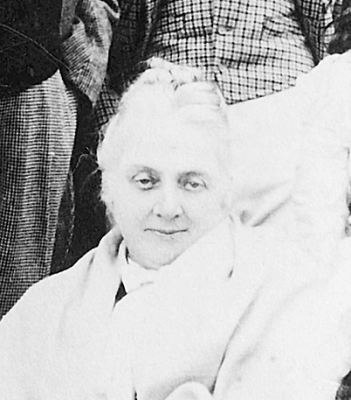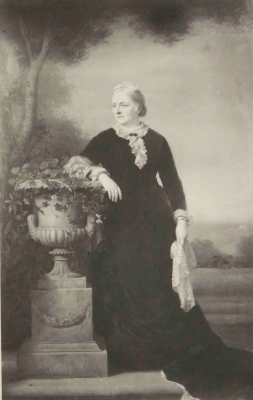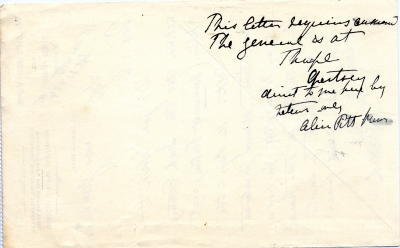Alice Margaret Stanley (1828 - 1910), wife of Augustus Henry Lane Fox Pitt-Rivers
Much of the information contained in this article is from the Bowden and Thompson biographies of Pitt-Rivers, other sources are marked individually.
When the author and Jeremy Coote gave a talk about the research project to the Museum of English Rural Life on 15 March 2011, one of the audience quite rightly asked about Pitt-Rivers' wife's life and its impact upon Pitt-Rivers' activities. It became obvious that in fact the project team had paid little attention to Alice and her influence. This page is a first attempt to repair that oversight.
In general Alice Pitt-Rivers has had a bad press. Her character was assassinated in a publication of the mid-twentieth century by a remote relative (Nancy Mitford), and Bowden (and other biographers) seem to agree with her harsh assessment. Looking at the few remaining original sources, however, give little idea of her character as she is seldom mentioned directly by people who knew her. So much of this webpage, like everything else that has been written about her, is taken from second-hand sources. The reader must make up their own mind but I think it fair to have a degree of scepticism about even the primary accounts. Victorian women were beginning to become more independent of their menfolk by the end of the nineteenth century but Alice was from an earlier generation and her own personality, interests and desires were subsumed to those of her husband. Pitt-Rivers' own character is not very clear to us today; so it is even more unlikely that we will be able to get a clear and unbiased account of her more than a hundred years after her death.
Alice Margaret Stanley was born in 1828, a year after her future husband. She was the eldest daughter of Edward John Stanley, 2nd Baron Stanley of Alderley, 1st Baron Eddisbury (1802-1869) and Henrietta Maria (1807-1895). Lord Stanley was a Whig politician and privy counsellor. Find out more about the Stanley family collections here. Bowden tells us that Alice was described by her mother as ''too short" but was pretty when in good health - which she did not enjoy at all times'. [1991: 23] She apparently gained a reputation with her family for miserliness, ill-health and misery. Her grandmother wrote to her mother that '[one of Alice's sisters will not be bored] - which of course brings poor Alice to one's thoughts - does anything amuse her? Was she ever amusable?' [Mitford, 1939: 6]
However, her family's accounts are not necessarily to be trusted. Nancy Mitford records that one of the less attractive traits in Henrietta Maria (her mother's) character is the favouritism she exhibits between her children, and of them all she liked Alice the least and treated her accordingly. 'Henry (Alice's eldest brother) was always her champion, and did what he could to help on her love affair with Major Fox to its favourable conclusion; Alice repayed his kindness by being the first member of the family to receive Fabia' (Henry's unacceptable wife). [Mitford, 1939: xvi]
Bertrand Russell, the famous philosopher, was Alice's nephew and he reports (in an edited volume of his parents' letters) that all the Stanley children had 'as good an education as they could assimilate (daughters as well as sons)'. [1937: 18] Because there is so little evidence of any independent activity from Alice the results of this education are not confirmed in her case but her siblings were universally acknowledged (with the exception of the eldest son) as being bright, disputacious and well-informed.
Alice came out on 5 February 1846, and Pitt-Rivers probably met her first around 1848. A year later he proposed to her (when he was aged twenty-two, which was young to marry at that time) but his first proposal was not accepted. In 1850 her grandmother remarked that 'I do wish Alice had a good husband of some kind or other - she would be so well with a child every year I have no doubt'. [Mitford, 1938: 234] The family did not wholly approve of Augustus as a husband, perhaps believing that Alice 'could do better'.
Lane Fox's prospects improved when his elder brother died in June 1852. Alice and Augustus finally became officially engaged in January 1853 and married a month later on the 2nd or 3rd of February 1853 at St George's Church, Hanover Square, in London. He was aged twenty-four. They honeymooned in Penrhyn Castle, Bangor in North Wales, at the home of Lane Fox's maternal uncle, Lord Penrhyn (the brother of his mother, Lady Caroline). Records show that throughout their marriage, as was usual, they holidayed with several relatives of his and Alice's, including at Ditchley Park with her uncle. Alice, in particular, was very well connected (as people said at that time, implying connections with 'high society' or the aristocracy).
It seems that at least at first the marriage was very happy. Indeed it had been clear from early on in their courtship that, whatever their own personality difficulties, Alice and Augustus saw eye to eye, Alice's mother wrote to her husband, '... the young Major (Lane Fox) and Alice laughed at each other's jokes ...'. Later Lord Stanley remarked that 'Alice is in very good spirits & seems to amuse herself greatly with the young Major'. [Mitford, 1939: 13, 59] So it is clear that she did have a sense of humour of some kind.
Alice became pregnant almost immediately after the wedding; unfortunately this pregnancy was to end in a still-birth. Bowden relates that Alice's grandmother joked 'as they are poor, cubs will come thick & fast - don't tell Mr Reynard pray, as he don't understand a joke'. [1991: 26] Bowden also tells us that Alice was only attended by the barrack master's daughter at the birth, so it might have been traumatic. Eventually Alice and Augustus were to have 9 children who reached adulthood born between November 1855, when Alice was twenty-seven, to April 1866 when Alice was aged thirty-eight. A full list of their children can be found here. Apparently her mother remarked a year before Alice's last child was born, 'I have heard Alice is again in the usual state, it was no surprise'. [Bowden, 1991: 29] One of the daughters was named after her, Alice Augusta Laurentia, her second daughter born in 1862 and later married to the much-older John Lubbock.
During the summer of 1853 Alice and Augustus moved to Hythe in Kent so Lane Fox could join the School of Musketry. In March 1854 Lane Fox travelled to Malta and the Crimea, leaving Alice behind in London. Bowden tells how Alice was distraught at their parting and wrote many letters, some of which survive. Lane Fox returned in November 1854 and convalesced for the next few months. In May 1855 Lane Fox and Alice left for Malta where they would be stationed for the next two years. Their two eldest sons would be born on the island.
On 4 August 1857 the Lane Foxes arrived back in Southampton aboard the Colombo. At first they lied with their parents-in-law at Dover Street, London whilst they tried to find a London house. They also travelled back to Alice's childhood home at Alderley, Cheshire for the summer (as they often did). By March 1858 they were settled in Park Hill House, Clapham Park in south London.
In November 1860 their fourth son was born and a month later Alice was gravely ill with suspected typhus. In August 1862 Lane Fox was appointed Assistant Quartermaster-General in Cork, Ireland and the family went to live there until 1866. Their London home was now 1 Chesham Street (Lane Fox's mother's house). From July 1867 Lane Fox took half-pay and did not have any Army professional duties. Presumably this allowed him to participate in family affairs more fully (if he wished). However, this also coincided with one of his busiest periods for archaeological investigation in Yorkshire and Sussex so he may not have been around much more than usual. In June 1869 her father died and Lane Fox (and possibly Alice, though women did not always attend funerals at this time) attended his funeral in Alderley. At some time in the 1860s Edward Burnett Tylor records meeting the Lane Foxes at a seance in London:
Of Mrs Basset[t] I had heard twice before ... once from Col. Lane Fox, who was with his wife at a séance at Lady Powlett's. When the phosphoric lights came, Mrs L-F [Lane Fox] let go Mrs Crookes' hand, jumped up & caught the lights & a very human hand[,] which struggled out of her grasp, which of course in the elaborate Medium report became a spirit hand. Mrs L-F has not I think cared much for the business since. [Unpublished ms in Tylor papers, PRM ms collections; cited in Stocking, 1971: 97]
Attendance at séances at this time is not proof of credulous belief, many people (including Tylor) attended in a spirit of scepticism. It is likely that Pitt-Rivers did similarly, or that his wife was interested and asked him to escort her. Pitt-Rivers, as an active member of the Anthropological Society of London in 1868, could have been involved in 'evaluating the claims of the Davenport brothers, visiting American mediums ... the committee of the Society specified a number of conditions for their continued participation; and when these were declined, they withdrew from the investigation'. (Stocking, 1971: 89)
In 1873 the Lane Foxes move to Guildford in Surrey so that Lane Fox can take command of the West Surrey Brigade Depot. They remain there until 1878. From 1879 they live at 19 Penywern Road, Earls Court, London. In fact their house comprised both 19 and 21, presumably to accommodate their large family. They remained there until Lane Fox inherited his large estate in 1880 from his great-uncle, then their family home in London became 4 Grosvenor Gardens and their country estate was at Rushmore House.
The change of circumstances and means in 1880 must have made a great deal of difference to Alice's life though these changes are not recorded, so far as is known. It seems likely that Alice accompanied Pitt-Rivers (as he had become) on his one trip to Egypt in February and March 1881. She would also accompany him on holidays in future years, mostly to the German-speaking parts of Europe.
In October 1882, Pitt-Rivers retired from the Army with the rank of Lieutenant-General. After 1882 Pitt-Rivers began negotiating with the University of Oxford to donate his first collection. During this period, in June 1883, Alice and Augustus went to stay with the Tylors in Oxford. This was shortly before Tylor took up his post of Keeper at the University Museum. Two years later in June 1885 Pitt-Rivers, accompanied by his family, visited Oxford presumably to visit his collection which had recently arrived, and also to attend Encaenia where an Honorary D.C.L. was awarded to Pitt-Rivers.
Alice and Augustus entertained many people at Rushmore. One of them was Thomas Hardy who according to Bowden said that it was a pleasant visit 'notwithstanding the trying temper of the hostess'. [1991: 33] They also entertained the Tylors, John Lubbock, William Blackmore and others. According to one of her relatives, Bertrand Russell, Alice was known for her cost-cutting ways, returning uneaten food to serving dishes for example. [1991: 31] This may be confirmed by a letter, shown here, from her son-in-law, John Lubbock [S&SWM L280]
However a much more positive take on Alice's character is given by Moncure Conway in his autobiography, published in 1904. In it he gives his impressions of the Pitt-Riverses and says of Alice:
Colonel Lane Fox and his wife (a daughter of Lord Stanley of Alderley) were aristocrats without airs. They were free from dogmatic notions, and often came to my chapel. We found them delightful neighbours. [pp. 303-4]
A motion to admit ladies to membership sprung on the Institute a "burning issue," and an evening was devoted to it. There had been receptions of members in private houses, and the intelligence of many of their ladies was well known. The Hon. Mrs. Pitt Rivers, Mrs. Tylor, Mrs. Huxley, and others were felt by the best men to be persons of serious interest in our pursuits, and these would have been admitted without controversy. [p. 306]
My wife and I enjoyed the hospitalities of Rushmore, and Mrs. Pitt Rivers took us on delightful drives ... Mrs. Pitt Rivers, with her culture and entertaining conversation, was the fit hostess for such assemblies. [pp. 308-9]
One of the few direct contacts with Alice Pitt-Rivers shows the way that Victorian society ways contrive to hide her from our gaze. A letter was received, presumably at Rushmore, in early 1898. At this time Pitt-Rivers was still in London where he had gone (perhaps for a Christmas visit) in December 1897. Unfortunately he had become ill and was forced to stay. Here is the letter in full:
L2039
Welch's Irish Views ... | Antiquarian, Geological, Peasant Life, ... | 49 Lonsdale Street | Belfast Jan 13th 1898
115 was [sic] sent | Sept 21 & 24th
Ansd H Gray
Dear Sir
Do you wish to retain all the Irish Ethnog. photos (permanent Platino) sent last Sept. 14 days is the usual time allowed for selection but as I knew that you had a special interest in this branch I did not stipulate for such prompt return if not of any not selection [sic]
Yours truly
R. Welch
Note on back:
This letter requiring answer | The general is at | Thorpe | Chertsey | Direct to me here by return only Alice Pitt Rivers
As the answer to Welch (now lost) was written by Harold St George Gray (Pitt-Rivers' secretary) it is clear Alice was forwarded the letter and in the note was instructing Gray on the action he should take. This suggests that she took a more active rôle in her husband's affairs than might be guessed by the biographies. The note suggests that Alice was not in the same place as her husband, however, which might be considered unusual if he were ill. At this time he was ill very frequently and she may have felt it more important to control affairs at Rushmore (assuming that was where she was). It is not clear what the house at Chertsey was, it may have been the home of a member of their family or close friends.
It seems that Alice suffered ill-health from time to time. From 1898 on, Pitt-Rivers was very ill: he was often confined to his bed and forced to rely on his secretary, Harold St George Gray, to answer his letters on his behalf. Alice was also unwell during this period, as a number of letters in the Salisbury and South Wiltshire Museum attest. However, they do not make clear what ailed her except that it was something to do with her leg (for example, see L2329 from a relative).
Augustus Pitt-Rivers died in May 1900. Alice lived with her second youngest son, Douglas, in Sedgehill, Dorset in 1901. She died on 19 May 1910 (almost exactly ten years after her husband) aged 82.
Bibliography for this article
Bowden, Mark 1991. Pitt Rivers: The Life and Archaeological Work of Lieutenant-General Augustus Henry Lane Fox Pitt Rivers, Cambridge: Cambridge University Press.
Mitford, N. 1938. The Ladies of Alderley: Letters between Maria Josepha Lady Stanley of Alderley and Henrietta Maria Stanley 1841-50 London
Mitford, N. 1939. The Stanleys of Alderley: Their letters between the years 1851-65 London
Russell, B. and P. [eds.] 1937. The Amberley papers : the letters and diaries of Lord and Lady Amberley. [2 vols] London: Hogarth Press
Thompson, M.W. 1977. General Pitt Rivers: Evolution and Archaeology in the Nineteenth Century Bradford-on-Avon: Moonraker Press.
AP, March 2011





